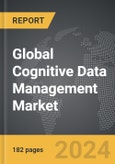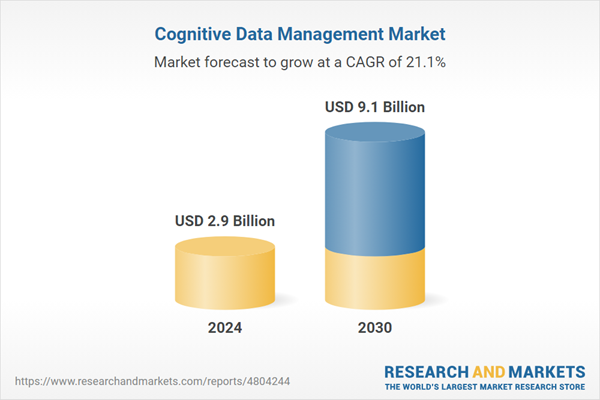Global Cognitive Data Management Market - Key Trends and Drivers Summarized
What Is Cognitive Data Management and How Does It Work?
Cognitive data management refers to the application of artificial intelligence (AI) and machine learning (ML) techniques to optimize, automate, and enhance data storage, access, analysis, and governance processes. Unlike traditional data management systems that rely on predefined rules and manual processes, cognitive data management systems use advanced algorithms to understand, learn from, and make decisions about data in real-time. These systems are designed to handle both structured and unstructured data, making them highly adaptable and capable of dealing with the vast volumes of diverse data that businesses generate today. Cognitive data management tools can analyze metadata, predict usage patterns, classify information, and suggest ways to streamline storage or improve data retrieval. By automating data categorization, reducing redundancies, and optimizing storage locations based on usage, cognitive systems help organizations manage their data more efficiently, while also maintaining data security and compliance with regulatory requirements. These capabilities make cognitive data management an essential component for enterprises that handle large datasets and need real-time insights without compromising on governance or security.How Are Cognitive Data Management Solutions Being Applied Across Industries?
Cognitive data management solutions are rapidly being adopted across various industries due to their ability to streamline data handling, improve decision-making, and reduce operational costs. In healthcare, cognitive data management systems are used to manage vast amounts of patient records, clinical data, and medical research. By automating the classification and retrieval of patient information, hospitals and clinics can reduce administrative burdens, improve patient care, and ensure compliance with privacy regulations like HIPAA. These systems also help healthcare providers analyze medical histories and treatments, enabling more personalized care and faster diagnosis. In the financial sector, cognitive data management systems are critical for managing transaction records, customer information, and compliance data. Financial institutions are using these systems to monitor and analyze vast datasets in real-time, detecting fraud, predicting financial risks, and automating regulatory reporting. By automating the organization and processing of this data, banks can reduce human error, improve customer service, and meet regulatory requirements more efficiently. In retail and e-commerce, cognitive data management helps companies optimize inventory management, improve customer engagement, and enhance personalized marketing efforts. Retailers can analyze consumer behaviors, purchase histories, and preferences using cognitive systems, enabling them to create targeted promotions and improve the overall customer experience. Industries such as manufacturing, logistics, and energy are utilizing cognitive data management to optimize supply chains, monitor equipment performance, and reduce downtime by predicting maintenance needs through data analysis.What Innovations Are Driving the Evolution of Cognitive Data Management?
The evolution of cognitive data management is being driven by several key innovations in AI, machine learning, and cloud computing. One of the most significant advancements is the development of machine learning algorithms that allow data management systems to become more predictive and autonomous. These algorithms can learn from patterns in data usage and automatically adjust storage strategies, predict data access needs, and suggest actions to optimize performance. For example, in enterprise environments, cognitive systems can predict which data will be accessed frequently and store it in high-speed storage systems while archiving less-used data in more cost-effective locations. This automated tiering improves data accessibility and reduces costs without manual intervention. Another major innovation is the integration of natural language processing (NLP) into data management systems. NLP allows cognitive data systems to understand and process human language, making it easier for users to interact with data through conversational queries. This advancement simplifies data access for non-technical users by allowing them to retrieve information and generate reports using simple language commands, reducing the need for specialized knowledge or data science expertise. Additionally, cloud computing has revolutionized cognitive data management by offering scalable, flexible storage solutions that support real-time data processing and management. Cloud-based cognitive data platforms allow organizations to access their data from anywhere, at any time, while providing robust security, automated backups, and cost-effective storage options. Data governance is also being enhanced through innovations in cognitive data management. Cognitive systems can automatically enforce data governance policies by classifying sensitive information, ensuring compliance with industry regulations, and alerting administrators to potential security risks. Blockchain technology is being integrated with cognitive data management systems to enhance data integrity and security. By using blockchain to create immutable records of data transactions, organizations can improve transparency and trust in their data management practices.What Factors Are Driving Growth in the Cognitive Data Management Market?
The growth in the cognitive data management market is driven by several factors. One of the primary drivers is the sheer volume of data being generated by organizations today, from social media interactions and IoT devices to transaction records and customer communications. Traditional data management systems are ill-equipped to handle this influx of unstructured data, leading to inefficiencies and missed opportunities. Cognitive data management solutions, with their ability to process and analyze vast datasets quickly, are becoming essential tools for businesses that want to leverage their data for real-time decision-making and strategic insights. Another key factor driving market growth is the rising demand for data governance and compliance. With data privacy regulations like the General Data Protection Regulation (GDPR) and California Consumer Privacy Act (CCPA) becoming more stringent, organizations are under increasing pressure to manage their data responsibly and ensure compliance. Cognitive data management systems can automate the enforcement of data governance policies, track the flow of sensitive data, and generate compliance reports, making them invaluable for organizations that must adhere to complex regulatory frameworks. Furthermore, the increasing concern around data security and the risk of data breaches is encouraging organizations to adopt cognitive data management solutions that offer enhanced security features, such as automated encryption and anomaly detection. Cloud computing is also playing a significant role in the growth of the cognitive data management market. Cloud-based cognitive systems provide the scalability, flexibility, and cost-efficiency that organizations need to manage growing datasets. As more businesses shift to cloud-based infrastructures, the demand for cognitive data management systems that can operate seamlessly in these environments is increasing. Lastly, the drive for digital transformation across industries is pushing companies to invest in technologies that can improve operational efficiency and provide a competitive edge. These factors are contributing to the rapid growth of the cognitive data management market, positioning it as a critical component of modern enterprise data strategies.Report Scope
The report analyzes the Cognitive Data Management market, presented in terms of market value (USD). The analysis covers the key segments and geographic regions outlined below.- Segments: Function (Operations, Sales & Marketing, Finance, Legal, Human Resource).
- Geographic Regions/Countries: World; United States; Canada; Japan; China; Europe (France; Germany; Italy; United Kingdom; and Rest of Europe); Asia-Pacific; Rest of World.
Key Insights:
- Market Growth: Understand the significant growth trajectory of the Operations Function segment, which is expected to reach US$4.1 Billion by 2030 with a CAGR of 21.9%. The Sales & Marketing Function segment is also set to grow at 20.2% CAGR over the analysis period.
- Regional Analysis: Gain insights into the U.S. market, valued at $810.8 Million in 2024, and China, forecasted to grow at an impressive 20% CAGR to reach $1.3 Billion by 2030. Discover growth trends in other key regions, including Japan, Canada, Germany, and the Asia-Pacific.
Why You Should Buy This Report:
- Detailed Market Analysis: Access a thorough analysis of the Global Cognitive Data Management Market, covering all major geographic regions and market segments.
- Competitive Insights: Get an overview of the competitive landscape, including the market presence of major players across different geographies.
- Future Trends and Drivers: Understand the key trends and drivers shaping the future of the Global Cognitive Data Management Market.
- Actionable Insights: Benefit from actionable insights that can help you identify new revenue opportunities and make strategic business decisions.
Key Questions Answered:
- How is the Global Cognitive Data Management Market expected to evolve by 2030?
- What are the main drivers and restraints affecting the market?
- Which market segments will grow the most over the forecast period?
- How will market shares for different regions and segments change by 2030?
- Who are the leading players in the market, and what are their prospects?
Report Features:
- Comprehensive Market Data: Independent analysis of annual sales and market forecasts in US$ Million from 2024 to 2030.
- In-Depth Regional Analysis: Detailed insights into key markets, including the U.S., China, Japan, Canada, Europe, Asia-Pacific, Latin America, Middle East, and Africa.
- Company Profiles: Coverage of players such as Attivio, Inc., CognitiveScale, Cognizant Technology Solutions Corporation, Datum LLC, Expert System S.P.A. and more.
- Complimentary Updates: Receive free report updates for one year to keep you informed of the latest market developments.
Some of the 13 companies featured in this Cognitive Data Management market report include:
- Attivio, Inc.
- CognitiveScale
- Cognizant Technology Solutions Corporation
- Datum LLC
- Expert System S.P.A.
- Hewlett Packard Enterprise Development LP (HPE)
- IBM Corporation
- Immuta Inc.
- Informatica LLC
- Infosys Ltd.
- Kingland Systems
- Microsoft Corporation
- Oracle Corporation
- Pingar
- Reltio
- Saksoft Limited
- Salesforce.com, Inc.
- SAP SE
- SAS AB
- SnapLogic, Inc.
- SparkCognition, Inc.
- StrongBox Data Solutions
- Talend SA
- Veritas Technologies LLC
- Wipro Limited
This edition integrates the latest global trade and economic shifts into comprehensive market analysis. Key updates include:
- Tariff and Trade Impact: Insights into global tariff negotiations across 180+ countries, with analysis of supply chain turbulence, sourcing disruptions, and geographic realignment. Special focus on 2025 as a pivotal year for trade tensions, including updated perspectives on the Trump-era tariffs.
- Adjusted Forecasts and Analytics: Revised global and regional market forecasts through 2030, incorporating tariff effects, economic uncertainty, and structural changes in globalization. Includes historical analysis from 2015 to 2023.
- Strategic Market Dynamics: Evaluation of revised market prospects, regional outlooks, and key economic indicators such as population and urbanization trends.
- Innovation & Technology Trends: Latest developments in product and process innovation, emerging technologies, and key industry drivers shaping the competitive landscape.
- Competitive Intelligence: Updated global market share estimates for 2025, competitive positioning of major players (Strong/Active/Niche/Trivial), and refined focus on leading global brands and core players.
- Expert Insight & Commentary: Strategic analysis from economists, trade experts, and domain specialists to contextualize market shifts and identify emerging opportunities.
Table of Contents
Companies Mentioned (Partial List)
A selection of companies mentioned in this report includes, but is not limited to:
- Attivio, Inc.
- CognitiveScale
- Cognizant Technology Solutions Corporation
- Datum LLC
- Expert System S.P.A.
- Hewlett Packard Enterprise Development LP (HPE)
- IBM Corporation
- Immuta Inc.
- Informatica LLC
- Infosys Ltd.
- Kingland Systems
- Microsoft Corporation
- Oracle Corporation
- Pingar
- Reltio
- Saksoft Limited
- Salesforce.com, Inc.
- SAP SE
- SAS AB
- SnapLogic, Inc.
- SparkCognition, Inc.
- StrongBox Data Solutions
- Talend SA
- Veritas Technologies LLC
- Wipro Limited
Table Information
| Report Attribute | Details |
|---|---|
| No. of Pages | 182 |
| Published | January 2026 |
| Forecast Period | 2024 - 2030 |
| Estimated Market Value ( USD | $ 2.9 Billion |
| Forecasted Market Value ( USD | $ 9.1 Billion |
| Compound Annual Growth Rate | 21.1% |
| Regions Covered | Global |









